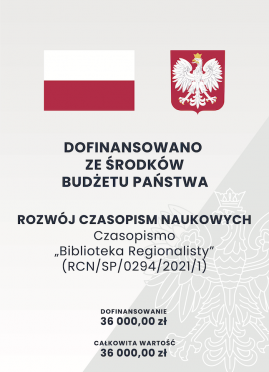Publishing ethics
Journal ethics
In the event of any misconduct on authors or reviewers side, the Journal Editors shall comply with the principles of publication ethics and will apply the procedures included in the diagrams of Committee on Publication Ethics (COPE).
Below are presented core responsibilities resulting from respecting publication ethics:
Author
- Author is responsible for presenting the research results in a reliable, honest and accurate way. Articles submitted to the journal should be original, not violating copyrights of third parties and they ought to correspond to the issues of the journal. It is considered unethical to submit or publish an article in more than one journal.
- Every article shall be subject to anti-plagiarism procedures in iThenticate system. All forms of plagiarism and auto-plagiarism are treated as unethical.
- Authors of submitted texts are obliged to read and understand the conditions of CC BY-SA 4.0 license.
- In case of collective work authors are obliged to make a statement about their contribution to the publication. The declaration is filled on article submission.
- Making quotes, reporting theorems and research findings or data prepared by other authors has to be annotated. The author is responsible for appending all sources used while preparing publication to the article.
- The author is responsible for informing the Editorial Committee about all potential conflicts of interest.
- The author is to notify the Editorial Committee without delay of instances of error or inaccuracy detection in a published article.
Editorial Board
- Accepting the article for publication the Editorial Board are committed in particular to its originality, quality and coherence with the scientific profile of the journal.
- Editorial Board of the journal make sure that ethical standards of the journal are respected and take great care good publishing practices are followed.
- Editorial Board document any manifestations of scientific unreliability, in particular concerning violation of ethics in science.
- Editorial Board may not disclose any information about a submitted manuscript apart from the author, reviewers, members of the Editorial Committee and publishing editors, as needed.
- Unpublished materials disclosed in the submitted article cannot be used in own research of the editorial office.
Reviewers
- Reviewers guarantee independence and the absence of conflict of interests in reviewer-author relationship. If a reviewer presumes an identity of the author of an article, he/she immediately informs the Editorial Committee about it.
- Reviews should be prepared objectively, in accordance with the rules of publishing ethics and based on substantive arguments. The core evaluation criteria are:
- originality of the problem/method,
- research methods used,
- substantive level, degree of performance of research goal, selection and and use of subject literature,
- transparency of arguments (language, citations, tables, figures
- topicality of the research problem
- application value.
Detailed rules of review procedure adopted by the journal are listed in the Review process section.
A reviewer is responsible to inform the Editorial Committee immediately in the case of suspected infringement of principles of scientific reliability.
All reviewed articles are kept confidential and their content cannot serve personal gain.







